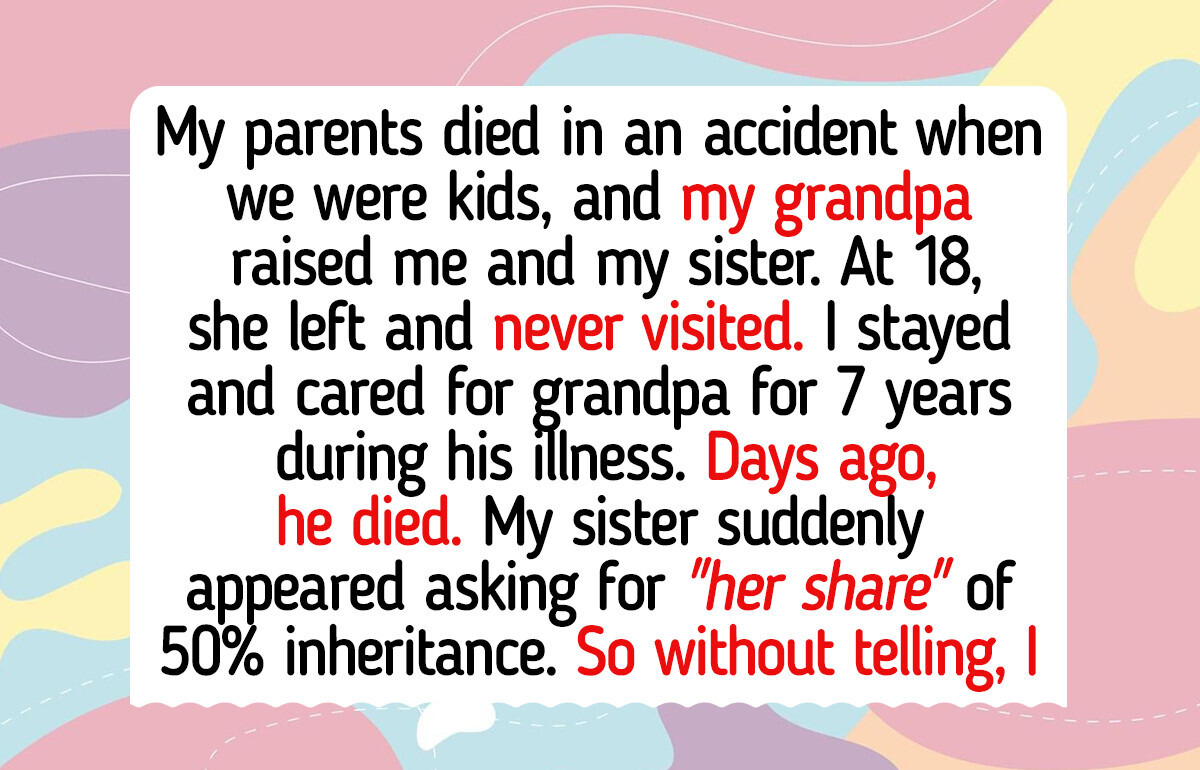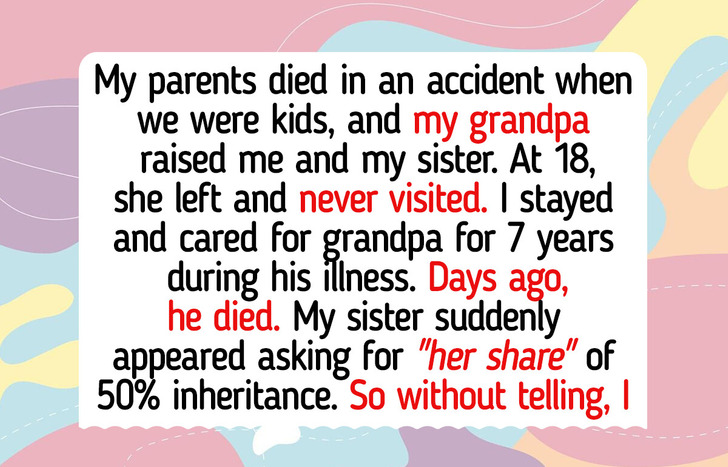You are absolutely doing the right thing. You stayed and took care of your grandfather, who cared for you and your sister when your parents died. I hope your grandfather foresaw your sister wanting to challenge the will and had doctors and lawyers verify that he was of sound mind and not being manipulated when he made his will. The best thing your grandfather could've done was leaving one dollar for her in his will 🤣🤣🤣🤣
I Refuse to Split My Grandfather’s Legacy — I Was the Only One Who Cared for Him


Family dramas often take us by surprise, especially when money, inheritance, and old emotions are involved. Stories of siblings clashing over what they see as “fair” strike a chord, since many secretly fear facing the same struggle one day. It’s no wonder that tales about last wills and shocking reunions often go viral. Recently, Bright Side received a heartfelt letter from a reader caught in just such a situation.
Kathy’s letter:
Hi Bright Side!
My parents died in an accident when we were kids, and my grandpa raised me and my sister. At 18, she left and never visited. I stayed and cared for grandpa for 7 years during his illness. A few days ago, he died. My sister suddenly appeared asking for “her share” of 50% of the inheritance.
What she didn’t know is that I was the one who got all the money — it was grandad’s final wish. So without telling anyone from the family, I took all the money and left town after the funeral, just like she had left the day she turned 18.
For days she tried to reach me but did not know where I was. But later, she ended up getting my contact and called me, demanding her half of grandpa’s inheritance.
She froze when I revealed that she’s not going to get a cent, and that all this time I’ve been secretly longing for the day she’d return begging me.

She was furious and said that I was stealing her rights and that I was heartless. She kept saying that she has a right to that money as much as I do, and that I had manipulated grandpa in his final days to make him leave all his money to me.
Of course, I hung up the phone and didn’t even bother answering her. But it’s been a few days that I’ve been pondering whether I’m doing the right thing, or if I should let her get at least some of that money even though she clearly does not deserve it.
Yours,
Kathy
Thank you, Kathy, for opening up and sharing your letter with such honesty. I can see how heavy this situation must feel, and I’ve put together 4 tips that might help you think through it from different angles.
Reframe the Inheritance as a Testament, Not a Transaction

My dad left only the $2k in his savings but felt like a million to me at the time. His love and caring are the real legacy once again shown by him making sure he always had a few grand in his safe to ensure at least very basic death cost would be helped. I used what he left for bills and my kids to have a last Christmas from grandpa for majority of it. The best thing he left me was a huge bag of pictures from a 35mm and probably older of our family and my childhood.
Instead of seeing this as “money she didn’t deserve,” remind yourself that your grandfather’s will was not about splitting assets equally but about gratitude. He saw you stay, care for him, and shoulder the burden your sister abandoned for years. The inheritance was his final thank you and his way of giving you security for the future, not something you manipulated into happening.
Use Symbolic Closure Instead of Splitting the Money

If you give her anything she can then claim half as an equal beneficiary so don't give her any if the money if she wasn't in the will.
Rather than giving her half or keeping everything in bitterness, create a symbolic act of closure that acknowledges her without betraying your grandfather’s intent. You could choose one meaningful item from his belongings — a watch, a book, a keepsake — and send it to her with a short note. This gesture recognizes her place in the family while making clear that the inheritance itself was not meant to be shared.
Flip the Script with Transparency
If her accusations (“you manipulated him”) are festering, disarm them by offering complete transparency about his decision. Send her a copy of the will, medical capacity records, or even notes and letters that show his clarity in leaving everything to you. You don’t need her approval, but proving it was his independent choice removes her strongest argument and forces her to face the truth directly.
Channel the Money into a Legacy, Not Just Yourself

If guilt persists and you worry about holding the money in isolation, consider using part of the inheritance in a way that actively reflects your grandfather’s life. Renovate his old home, or support a cause he loved so his presence continues to shape the world. This way, the inheritance becomes more than wealth — it becomes a living tribute that justifies why it was entrusted to you alone.
Another letter from one of our readers reveals a tense family dispute. Rachel refused to let her stepdaughter move in, believing her own daughter’s comfort had to come first. But what happened next was completely unexpected. Read her story here.
Comments
Even if your grandpa had a will leaving you everything, your sister could still try to break the will. You really get a lawyer to represent you.
I agree, but should be prepared with a lawyer
Related Reads
My Sister Forbade My Wheelchair at Her Wedding—She Wasn’t Ready for My Payback

12 People Who Chose Kindness When They Could’ve Walked Away

I Refused to Be Humiliated by My MIL, So I Quickly Responded With the Ultimate Payback

15 Guests Whose Audacity Knew No Bounds

I Refuse to Let My Homeless Stepdaughter Move In, This Is Not an Affordable Housing

15 Moments That Inspire Us to Stay Kind Even If the World Forgets How

13 Coworkers From Hell Who Took Workplace Drama to New Levels

10 Travelers Who Took “Breaking the Rules” Way Too Far

My Mom Forgot About Me Until She Needed My Help—I Turned the Tables on Her

20+ Moments That Remind Us That Kindness Costs Nothing but Means Everything

I Refused to Be the Fall Guy After My Boss Called Me "Useless"—I Had Him Reassigned and Took His Clients

My Friend Referred Me to My Job and Expected Money in Return, but I Refused and Everything Changed

